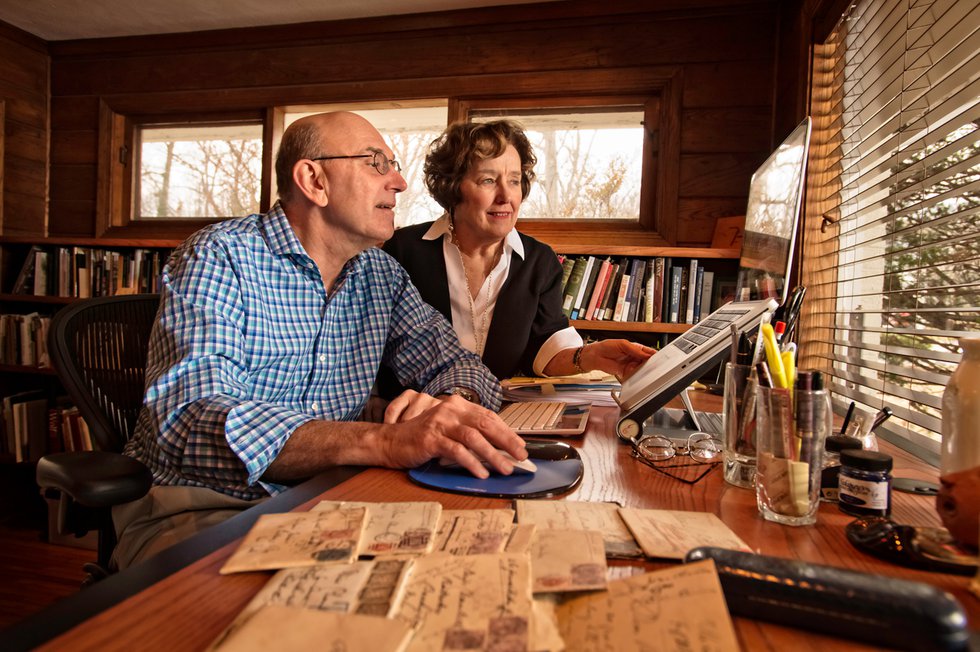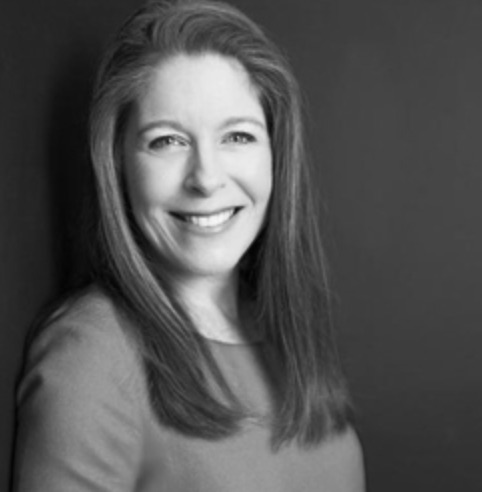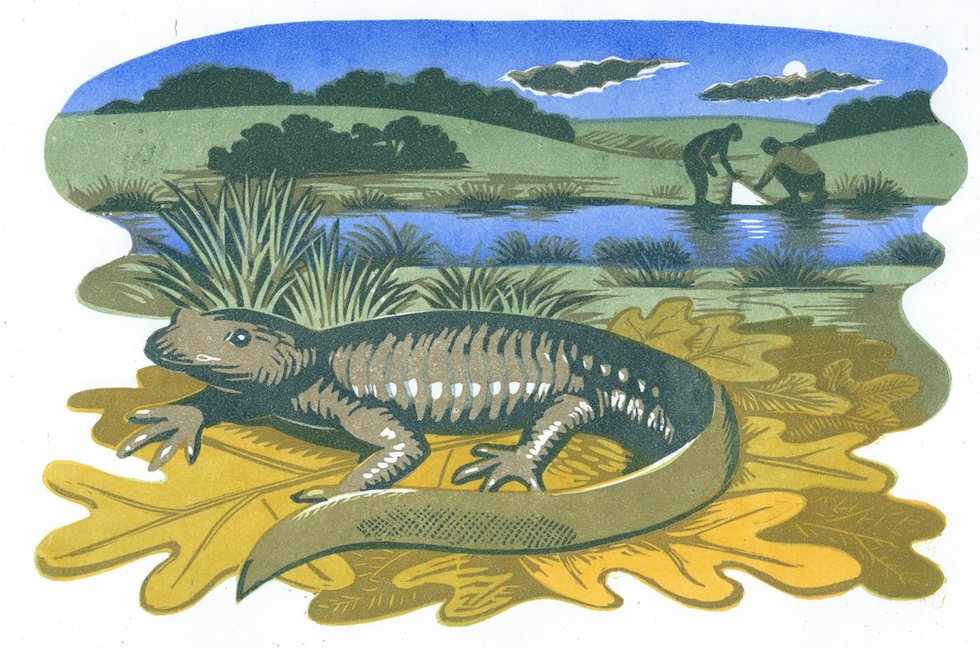For Charlottesville authors Henry Wiencek and Donna M. Lucey, writing books isn’t a solitary pursuit. It’s a contact sport.

Henry Wiencek and Donna M. Lucey at home with their goldendoodle Jussi.
Photos by Mark Edward Atkinson
There is a certain Walter Mitty quality to authors Henry Wiencek and Donna M. Lucey. Meeting them on a drizzling late winter morning at their snug Charlottesville home, nothing seems out of the ordinary. Inside, a wood fire pops and hisses, startling the couple’s snoozing goldendoodle Jussi (pronounced you-see).
Coffee brews in the kitchen and papers wait to be read in their offices—Henry’s paneled in warm wormy chestnut, Donna’s washed in a cheerful yellow and occupying the lower floor of the house.
As we talk, the woolly-headed Jussi helps himself to a muffin left unattended on a low table and gets a scolding. He looks crestfallen. So they give him another bite.
It’s the kind of space you’d expect authors like Wiencek and Lucey—independent journalists and scholars who have published 16 books of non-fiction between them—to inhabit. It is a place of order and quiet. Writerly.
But that’s where any likeness to the daydreaming hero of James Thurber’s 1939 story ends. These two are real life adventurers—more Shackleton than Mitty.
Married for 36 years, the couple first met in New York after college—Georgetown for Lucey and Yale for Wiencek—when they were both writers for Time-Life Books. They moved to Charlottesville in 1992 for a project Wiencek was working on at the time, and decided to stay.
Research for their books can take years. They comb through archives and forgotten attics and immerse themselves in the lives of their subjects, who have included George Washington and others in the founding era for Wiencek, and what Lucey describes as “badass women” of the Gilded Age—women who did something to shock, to upend social rules of the period.
This sort of lengthy research is like falling down the rabbit hole—consuming, even disorienting. “Whether you want it to or not, it takes over all of your brainpan space,” says Wiencek, whose next book Stan & Gus, due out in 2019, chronicles the lives and friendship of American sculptor Augustus St. Gaudens and preeminent architect Stanford White. Wiencek says he lives more in their world than his own. Being transported in this way is not particularly enjoyable he is quick to add. “It’s unnerving. You want to get the darn thing over with so you can get back to your own zone.”
But there is no fast-forward button. “You have to read every word,” explains Lucey who waded through 35 years of diaries for her 1991 book Photographing Montana 1894-1928: The Life and Work of Evelyn Cameron (and encountered a nest of rattlesnakes in the process). “You know what she ate for breakfast, when she milked the cows, churned the butter. You have to keep track,” she says, because there may be a few words that are really interesting. Those moments of discovery are incredible, she says.

The couple in Wiencek’s study.

Private Astor family correspondence Lucey used while writing Sargent’s Women.

The authors’ books.
Working from correspondence and diaries like the cartons Lucey shows me of private Astor family papers that were loaned to her for her latest book Sargent’s Women: Four Lives Behind the Canvas, published last fall, can make it seem as if the books will write themselves, but it’s never like that, says Wiencek. The stories that emerge from the material are often, at first, fragmentary and chaotic. But because the subjects of their books are dead, he laughs, “You can’t just pick up the phone and say, ‘Can you explain to me what happened that day?’” That’s why these books take so long to write. “In some ways the longevity is part of the joy,” says Lucey.
Joy, however, can seem like a distant prospect at times.
For Wiencek’s 1999 book The Hairstons: An American Family in Black and White, he attended 10 reunions and spent years winning the trust of enough of the descendants of the owners of North Carolina’s Cooleemee Plantation to understand their family’s complex story. The project was so difficult and Wiencek had hit so many dead ends that Lucey says she found her husband on the floor one morning in his office, papers strewn all over, “and he’s looking at me, and I’m thinking he’s lost it.”
The book was late, very late. And then Wiencek received a call from his publisher saying it had been cancelled.
“The lawyers were after us saying we owed them a huge amount of money,” he says. The advance, though sizable, was long gone. “We were living on air.” Wiencek didn’t know what the next step would be. Then, he says, one night, a ghost came to him and spoke a name, “Elias.” That bit of information helped him locate a document that kickstarted his research. “So that’s the level of insanity that I got to on this,” he says. He finished the book and resold it. It went on to win the National Book Critics Circle Award.
And then there is the criticism. “It’s an inevitable part of the work, and you just live with it and move on,” says Wiencek.
He faced a backlash for his 2012 book Master of the Mountain: Thomas Jefferson and His Slaves in which he argues that Jefferson in his later life was not, as is the prevailing thought, conflicted about slavery. Fiery responses from Jefferson scholars appeared in news outlets all over the country—the Washington Post, New York Times, NPR, Smithsonian Magazine and others. “You know I have to say it was probably harder on me than on Henry,” says Lucey. “I think I’m more sensitive. The nice thing about him is he doesn’t mind facing critics. But there were people throwing bricks and they refused to actually engage him. Charlottesville is a small town and there are certain people who still won’t talk to him.”
Lucey takes a moment to consider why—despite the criticism and the financial ups and downs—they have continued their work all these years. It’s the adventure she says. Wiencek is quicker to respond. “Well, this is what we do. I mean, we were born to do this and you can’t get away from it.”
This article originally appeared in our April 2018 issue.










